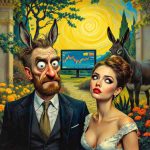
Understanding Herd Mentality in Trading
Oct 1, 2024
Herd mentality, a phenomenon where individuals mimic the actions of a larger group, plays a significant role in financial markets. This behaviour often leads to trading mistakes as investors follow the crowd rather than making independent, well-informed decisions. The ancient Chinese philosopher Lao Tzu (6th century BC) observed, “The wise man knows what he does not know.” This wisdom underscores the importance of self-awareness and critical thinking in trading, qualities often lacking when herd mentality takes hold.
In the stock market, herd behaviour can manifest in various ways, from irrational exuberance during bull markets to panic selling during market downturns. These collective actions can amplify market movements and lead to significant deviations from fundamental values, resulting in costly trading mistakes.
The Psychology Behind Trading Mistakes
Mass psychology plays a crucial role in shaping market behaviour and contributing to trading mistakes. Investors often fall prey to emotional decision-making driven by fear, greed, and the desire to conform. Sigmund Freud (1856-1939), the father of psychoanalysis, noted, “The ego is not master in its own house.” This observation aptly describes how traders can lose control of their rational decision-making processes when caught up in market sentiment.
One common trading mistake stemming from herd mentality is the tendency to buy high and sell low. During market rallies, investors may feel pressured to join the buying frenzy, fearing they’ll miss out on potential gains. Conversely, during market crashes, panic can lead to hasty selling, often at the worst possible time.
Cognitive Biases and Their Impact on Trading
Cognitive biases significantly influence trading decisions and can exacerbate the effects of herd mentality. Confirmation bias, for instance, leads traders to seek information supporting their beliefs while ignoring contradictory evidence. This can result in a false sense of confidence and poor investment choices.
Daniel Kahneman, a Nobel laureate in economics, highlighted the impact of cognitive biases on decision-making. He stated, “We are prone to overestimate how much we understand about the world and to underestimate the role of chance in events.” This tendency can lead traders to attribute market movements to their own skills rather than recognizing the role of luck or broader market forces.
Technical Analysis: A Double-Edged Sword
While a valuable tool for many traders, technical analysis can sometimes contribute to herd behaviour and trading mistakes. When large numbers of traders rely on similar technical indicators, it can create self-fulfilling prophecies and amplify market movements.
For example, if many traders use the same moving average crossover strategy, their collective actions can push prices in a particular direction, reinforcing the signal’s perceived validity. This phenomenon can lead to trading mistakes as traders follow technical signals without considering other fundamental factors.
Benjamin Graham, the father of value investing, cautioned against over-reliance on technical analysis, stating, “In the short run, the market is a voting machine, but in the long run, it is a weighing machine.” This wisdom reminds us that while short-term price movements may be influenced by popular sentiment, long-term value ultimately prevails.
Historical Examples of Herd-Driven Trading Mistakes
The dot-com bubble of the late 1990s serves as a prime example of how herd mentality can lead to significant trading mistakes. Investors caught up in the excitement of new internet technologies poured money into tech stocks with little regard for fundamental valuations. When the bubble burst in 2000, many investors suffered substantial losses.
Another notable instance is the 2008 financial crisis. As housing prices soared in the years leading up to the crisis, many investors and financial institutions ignored warning signs, believing that real estate values would continue to rise indefinitely. This collective delusion led to a series of trading mistakes that ultimately contributed to a global economic downturn.
The Role of Media in Amplifying Herd Behavior
Modern media plays a significant role in shaping market sentiment and potentially exacerbating herd-driven trading mistakes. The constant stream of financial news and analysis can create an echo chamber effect, reinforcing popular opinions and encouraging groupthink among investors.
Marshall McLuhan (1911-1980), a media theorist, famously stated, “The medium is the message.” In the context of financial markets, this suggests that how information is presented can be as influential as the information itself. Sensationalized headlines and rapid-fire news updates can trigger emotional responses and impulsive trading decisions.
Contrarian Investing: Swimming Against the Tide
Contrarian investing, which involves going against prevailing market trends, can be an effective strategy for avoiding herd-driven trading mistakes. Contrarian investors often identify opportunities that others miss by resisting the urge to follow the crowd.
Warren Buffett, one of the most successful investors of our time, embodies this approach with his famous advice: “Be fearful when others are greedy, and greedy when others are fearful.” This strategy requires discipline and a willingness to withstand short-term market pressures, but it can lead to significant long-term gains.
The Importance of Independent Thinking
To avoid falling victim to herd mentality and making common trading mistakes, investors must cultivate independent thinking. This involves developing a strong understanding of financial principles, conducting thorough research, and maintaining emotional discipline.
The Greek philosopher Aristotle (384-322 BC) emphasized the importance of critical thinking, stating, “It is the mark of an educated mind to be able to entertain a thought without accepting it.” In trading, this translates to considering various market opinions and analyses without blindly following them.
Risk Management and Diversification
Effective risk management is crucial for mitigating the potential impact of trading mistakes driven by herd mentality. Diversification, in particular, can help protect investors from the consequences of following the crowd into overvalued or risky assets.
Harry Markowitz, who developed modern portfolio theory, emphasized the importance of diversification, noting, “Don’t put all your eggs in one basket.” This simple yet powerful principle can help investors avoid the pitfalls of concentrated bets based on popular sentiment.
The Role of Education in Preventing Trading Mistakes
Education plays a vital role in helping investors recognize and resist herd mentality. By understanding the psychological factors that drive market behaviour, traders can make more informed decisions and avoid common pitfalls.
Benjamin Franklin (1706-1790) wisely observed, “An investment in knowledge pays the best interest.” This sentiment holds particularly true in the world of trading, where continuous learning and self-improvement are essential for long-term success.
Conclusion: Navigating the Herd
Herd mentality remains a powerful force in financial markets, often leading to significant trading mistakes. By understanding the psychological and cognitive factors that drive this behaviour, investors can better navigate market complexities and make more informed decisions.
As we’ve explored, the insights of thinkers from various disciplines and eras offer valuable guidance for modern traders. From the ancient wisdom of Lao Tzu to the economic theories of Harry Markowitz, these perspectives remind us of the timeless challenges and opportunities in financial markets.
Ultimately, successful trading requires a combination of knowledge, discipline, and self-awareness. By cultivating these qualities and remaining vigilant against the pull of herd behaviour, investors can minimize trading mistakes and improve their chances of long-term success in the financial markets.










